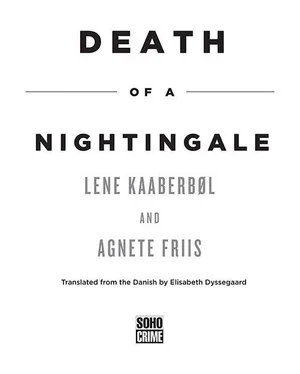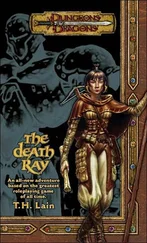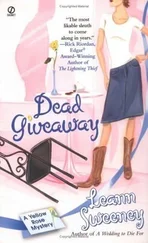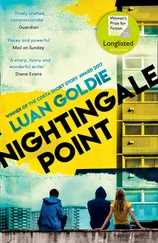Lene Kaaberbol - Death of a Nightingale
Здесь есть возможность читать онлайн «Lene Kaaberbol - Death of a Nightingale» весь текст электронной книги совершенно бесплатно (целиком полную версию без сокращений). В некоторых случаях можно слушать аудио, скачать через торрент в формате fb2 и присутствует краткое содержание. Год выпуска: 2013, ISBN: 2013, Издательство: Soho Crime, Жанр: Старинная литература, на английском языке. Описание произведения, (предисловие) а так же отзывы посетителей доступны на портале библиотеки ЛибКат.
- Название:Death of a Nightingale
- Автор:
- Издательство:Soho Crime
- Жанр:
- Год:2013
- ISBN:1616953047
- Рейтинг книги:5 / 5. Голосов: 1
-
Избранное:Добавить в избранное
- Отзывы:
-
Ваша оценка:
- 100
- 1
- 2
- 3
- 4
- 5
Death of a Nightingale: краткое содержание, описание и аннотация
Предлагаем к чтению аннотацию, описание, краткое содержание или предисловие (зависит от того, что написал сам автор книги «Death of a Nightingale»). Если вы не нашли необходимую информацию о книге — напишите в комментариях, мы постараемся отыскать её.
Death of a Nightingale — читать онлайн бесплатно полную книгу (весь текст) целиком
Ниже представлен текст книги, разбитый по страницам. Система сохранения места последней прочитанной страницы, позволяет с удобством читать онлайн бесплатно книгу «Death of a Nightingale», без необходимости каждый раз заново искать на чём Вы остановились. Поставьте закладку, и сможете в любой момент перейти на страницу, на которой закончили чтение.
Интервал:
Закладка:
Anton had already moved on, in a peculiar gait that was supposed to look like the way Super Mario moved in his favorite Nintendo game. Ida gave her a quick fist bump on the shoulder—the height of teenage affection—and waved at another big sister who stood at a careful distance from the noise and the barrels, contriving to look bored.
“Millie! Hi, Millie!”
As soon as Ida was out of hearing, the question jumped out of Nina’s mouth without permission. “What’s wrong?”
Morten didn’t answer right away. “I didn’t know you were coming,” he said.
“Of course I was coming. I usually do.”
“When you have time …”
“Morten, can’t we …”
“I may need to move,” he said.
Her chest felt wooden. “Where?” she croaked. “Why?”
“I don’t know,” he said. “Far enough to rescue the children from your war zone.”
“ What ?”
“You promised to stop.”
“I have stopped. The network doesn’t exist anymore. Besides, a clinic is being established, a clinic where people can be treated anonymously …”
He didn’t even look at her. She could see that his entire body was on high alert. He was repressing an anger so great that there was barely room for it inside him.
“What?” she asked. “What is it you think I’ve done?”
“She touched Anton. She grabbed him. Do you know how frightened he was?”
“Who?”
“I don’t know. Some disturbed woman who said she was your friend. She was looking for her daughter.”
Natasha. It couldn’t be anyone else.
“Where did you see her?”
Now Morten gaped at her. “Oh, I knew it,” he said. “You know what? It would almost be easier if you were an alcoholic. Then at least there’d be Antabus.”
Bang. The first blow connected with the decorated barrels to general cheering and applause. Bang, bang.
Nina stared at Super Mario Anton, almost wishing that Morten would move away with the children, at least for a while. Until … until this was over. Natasha had grabbed Anton. What would have happened if Anton had been alone? Natasha was desperate. Exactly how desperate Nina could tell from her own irregular heartbeats. And she no longer had any idea where Natasha’s limits lay. “A child for a child—give me my daughter, and you can have your son.” Would she do that?
Nina had no idea.
Natasha eased the knife blade between the door and the doorframe and forced it. The frame shattered, and with a few extra wriggles, the pawl broke loose from the lock.
There had been no answer when she had tried the buzzer downstairs or later when, after making it into the stairwell on the heels of someone’s pizza delivery, she rang the bell at the nurse’s front door. But she had to check. She had to know. She walked rapidly down the hall, throwing all the doors wide open.
No one was there.
In the kitchen there were still dirty dishes by the sink, and someone had left the milk out on the counter. The girl’s room was surprisingly neat, almost neater than the rest of the apartment. The walls were dark purple; all the furniture was black. Small, powerfully scented candles stood in red and orange glasses. The boy’s room was one big chaos of sheets, LEGO blocks, stuffed animals and small plastic figurines that it seemed he collected; most of them looked to be some kind of monster.
Nowhere did she see anything that could be Katerina’s. And the double bed in the bedroom only had one pillow on it.
Nina’s husband had told the truth. Nina didn’t live here anymore. And this wasn’t where she had gone with Katerina.
Natasha knew that she shouldn’t stay here, that every second increased her risk of being discovered. But her bladder was about to burst. She found the little bathroom at the end of the hall, closed the door and peed so hard, it splashed in the bowl.
Her thoughts were leaping in all directions, like the grasshoppers in the long grass next to the railroad in Kurakhovo. Katerina wasn’t here. Nina wasn’t here. She had broken into someone’s apartment for nothing.
Alarms. Were there alarms? She hadn’t heard anything, but perhaps not all alarms rang as earsplittingly as the one Pavel had installed in the apartment in Kiev.
IT HAD BEENof no use. During the last eighteen months they had lived there, they were burgled four times. The first time she had been at the doctor’s with Katerina and came home to an open door and an apartment that had been searched.
“In the middle of the day,” she had said to Pavel when she called him, with a childish sense that break-ins were supposed to happen after dark. “Should I call the police?”
“No,” said Pavel. “I’ll take care of it. Where are you now?”
“In the apartment,” she sniffed. “Where else?”
“Take Katerina to the park,” he said. “Or wherever it is you usually go. Do it now.”
“But the door won’t shut. And everything is a mess.”
“Just do as I say. I’ll come get you when everything has been taken care of.”
And he did. Everything had been cleaned up, the door was repaired and there was a new lock. If it weren’t for the smell of fresh wood and paint, you would think it had never happened. He had even bought shashlik, rice and salad from the Tatar restaurant in the square so she didn’t need to think about dinner. And when she wanted to talk about it, to tell him how afraid she had been, to tell him about the open door that she at first thought she had forgotten to lock, about the sensation in her throat when she realized that someone had been there, someone had gone through their things and taken her new iPod and earrings and necklace … then he had hushed her.
“We’ll forget this,” he said. “You can’t worry about things like that. Life is too short.”
The second time, he had bought extra locks and a safety chain. The third time she had been home alone. She had fallen asleep on the couch and woke up to the sound of a screwdriver splintering the doorframe. She had stood in the hallway screaming hysterically—“I’ll call the police, I’ll call the police”—so loudly that Katerina had woken up and begun to cry.
“There’s a lot of crime in Kiev,” said Pavel. “There’s no avoiding it.”
The fourth time … she didn’t want to think about the fourth time.
SHE WASHED HERhands and her stiff, cold face and dried them on one of Nina’s towels. Nina’s husband hadn’t wanted to say where Nina lived now. But sooner or later she’d have to go to work. Sooner or later she would have to drive down the narrow, winding road to the camp in her ugly yellow car that was only half the size of Natasha’s stolen Audi.
More waiting. But Natasha had become very good at waiting.
UKRAINE, 1934
There is nothing greater, nothing worse than death.
Or maybe there was. Maybe hunger was worse. It hurt when fat and muscle shrank away from your bones. In hunger there was, beyond the pain, also the fear of death, and maybe it was really fear that trumped both hunger and death, Olga thought. Maybe fear was worst.
Olga turned over one more time—carefully, so as not to wake up Oxana and Kolja. She was in her old sleeping place in the house in the village, on the bed shelf above the huge brick oven. The wood shavings in the mattress were fresh, and for once the lice kept their distance. In a way everything was as it had been before, and yet nothing was the same. The house still smelled of Father and Svetlova and the life they had lived together, and Father’s absence filled the whole house—on this night worse than ever. Butka, who worked down at the lumber mill, had come to see Mother today and had told her that Father had not been sent to Siberia, after all, as Olga had imagined. In her thoughts she had followed him in the cattle car to the endless snow-covered steppes. She had felt his thirst and hunger and had hoped … had even prayed to the nonexistent God to protect him and bring him home whole, with all his arms and legs and toes and fingers still there.
Читать дальшеИнтервал:
Закладка:
Похожие книги на «Death of a Nightingale»
Представляем Вашему вниманию похожие книги на «Death of a Nightingale» списком для выбора. Мы отобрали схожую по названию и смыслу литературу в надежде предоставить читателям больше вариантов отыскать новые, интересные, ещё непрочитанные произведения.
Обсуждение, отзывы о книге «Death of a Nightingale» и просто собственные мнения читателей. Оставьте ваши комментарии, напишите, что Вы думаете о произведении, его смысле или главных героях. Укажите что конкретно понравилось, а что нет, и почему Вы так считаете.










